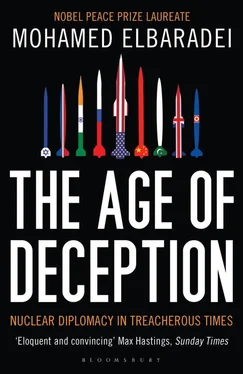I had no intention of staying in my box.
11
IRAN, 2007–2008
Squandered Opportunities
The U.S. perception of the Iranian regime as a gang of glassy-eyed radicals had deep emotional roots, reaching back to the hostage crisis of 1979–1981. For the Iranians, their sense of the United States as the Great Satan went back still further, to 1953 and the overthrow of the Mossadegh government by the CIA. In both capitals, talk of the relationship was frequently tinged with an element of ideological and even religious fervor.
For the hard-liners in the Bush administration, the very notion of engagement with Iran represented a moral compromise. Their ultimate goal was regime change. But by 2007, the catastrophe of the Iraq War meant that a military strike on Iran no longer appeared to be a viable option, at least for the present. So the administration promoted Plan B: a policy of sanctions and isolation intended to cause Iran to buckle under pressure, particularly on the nuclear issue.
Sanctions served to express the international community’s displeasure, but, in my view, they could not resolve the issue. And the notion of Iran buckling was a fiction: although the idea played well inside the Beltway, it had nothing to do with reality. Nonetheless, U.S. hard-liners worked to undermine all European efforts to resume dialogue with Iran, especially when it came to uranium enrichment. At any point that conditions for a breakthrough seemed within reach, the Americans found a way to block progress. To the extent that the United States entered the discussion, on the periphery of P-5+1 attempts to restart negotiations, it was only to set the one condition certain to be ultimately rejected: the futile demand that Iran fully give up its enrichment.
The result was self-imposed failure by way of ideology. Provoked by sanctions and harsh rhetoric, Tehran continued to direct the steady buildup of its uranium enrichment expertise. By early 2007, with a few hundred centrifuges operating and more being installed daily, the Iranians were on their way to gaining the technological know-how the Americans deemed unacceptable. The U.S. policy was yielding one achievement only: the price of any eventual agreement was growing ever higher.
To forge a means of bringing the parties back to negotiations, I began to work on a new set of ideas. However, the United States was not the only country that required some coaxing. France, too, had recently veered toward a more uncompromising stance, and I wanted to understand why.
During a mid-January trip to Paris, I heard from Foreign Ministry officials that their recent statements on Iran were designed to keep the Americans engaged in the process. Bush had talked to Chirac some two years earlier about the very real threat of Israeli military action against Iran, and the French remained anxious. I was reminded of Britain’s none-too-successful strategy prior to the 2003 invasion of Iraq: the claim that they were staying close to the United States in order to influence U.S. policy.
In addition, the Gulf countries and Egypt had been calling for the West to exert maximum pressure on Iran. Some Arab leaders, for example, had urged Chirac to refrain from sending his foreign minister, Philippe Douste-Blazy, to Iran.
I understood that the French, the tenth-largest oil consumers in the world, wanted to protect both their friends and their interests in the Gulf. [1] The French company Total SA is the fourth largest publicly traded oil producer in the world, with operations in Africa, Europe, and the Middle East.
But it was disheartening to hear that Arab countries were opposing diplomacy instead of taking a role in mediating the dispute. The EU’s Javier Solana passed on that he, too, was being pressed by Arab leaders not to make concessions or provide incentives to Iran.
The United States had been doing its best to fan the fear of Iran in the Gulf. But to me the actions of the Arab regimes were predominantly a sign of their impotence. For all of Tehran’s considerable faults, the Iranians were working on every front, well beyond just nuclear technology, to become more scientifically advanced, to improve their educational standards, and to assert their leadership in the region. The Arab regimes, apparently, were envious and afraid. Rather than working to catch up, to enhance their own knowledge and technology base, and to establish equilibrium across the region—or even to agree on common policies on how to deal with Iran—they were working through their Western allies to bring down the Islamic Republic. [2] The release of diplomatic cables from the WikiLeaks Web site in late 2010 pointed toward more efforts by Arab leaders behind the scenes, in which they allegedly urged the United States to conduct military strikes on Iran. See, for example, “Arab Leaders Urged U.S. to Attack Iran, WikiLeaks Says,” Mark Hennessy, Irish Times , November 29, 2010.
In a meeting with French foreign minister Douste-Blazy, he suggested that I go public and propose the idea of a “double-suspension” as the trigger for all parties to enter into negotiation: Iran would suspend its enrichment activities and the Security Council would suspend its sanctions. The idea was not new, in fact; it was embedded to some extent in the council’s most recent resolution. But it had gotten no traction.
I told Douste-Blazy I would be happy to make the call for a “pause” but wanted to avoid using the word suspension . The World Economic Forum in Davos, scheduled for the next week, would be a good place to unveil the initiative. “You are the only person who can do this,” Douste-Blazy said, “because you are not part of the negotiation, and also because of your status as a Nobel Peace laureate.”
This conversation was followed by a call from Sergei Kislyak, the Russian deputy minister of foreign affairs. The Russians were concerned that the Iranians no longer appeared to be talking to anyone. I floated the ideas from my talk with Douste-Blazy, and Kislyak pledged support for such a proposal. Further refinement came from talking to Ursula Plassnik, the Austrian foreign minister and a close friend, who suggested using the term time-out instead of pause . A time-out might sound a bit softer, she said, and therefore appeal more to the Iranians.
That was, in fact, the term I used in Davos, in interviews with both CNN and the BBC. I proposed that Iran take a time-out from its enrichment activities and the international community take a time-out from its implementation of sanctions. Official expressions of support followed from President Putin, [3] Putin expressed support for the proposal at the Munich Conference on Security Policy on February 10.
the Germans, and the French. The Chinese also lent their support, but they preferred to wait to air their views publicly at the March IAEA Board meeting. The Americans did not reject the proposal but simply said that the latest Security Council resolution [4] SCR 1737, passed on December 23, 2006.
was clear on what Iran needed to do. Ali Larijani, chairman of the Iranian Parliament, called to say the Iranians needed some clarification through informal talks before formally pursuing the idea, but they were definitely interested.
While at Davos, I also ran into former president Khatami and took the time to tell him that some of Ahmadinejad’s statements—particularly about Israel and the Holocaust—were severely damaging Iran’s international image. These statements, together with uncertainty about Iran’s nuclear intentions because of inspection issues that remained unresolved, were fomenting distrust throughout the region. Khatami expressed regret about some of what we were hearing from Tehran and said he would carry back the message.
Читать дальше












